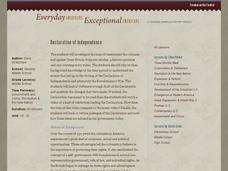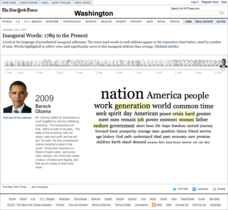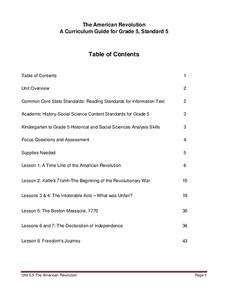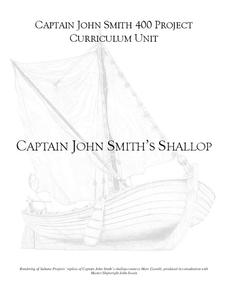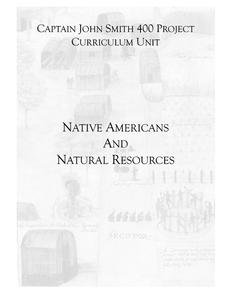Roy Rosenzweig Center for History and New Media
Declaration of Independence
Give budding historians a guided exploration of the Declaration of Independence, historic photos, videos, and more as they deepen their understanding of the American Revolution and the attitude of the colonists leading up to the war.
Roy Rosenzweig Center for History and New Media
Immigrant Discrimination
For a class learning about Chinese and Irish immigration in America, here's a great starting lesson plan. It has your critical thinkers examining song lyrics, the Chinese Exclusion Act of 1882, and a political cartoon, and finally...
Advocates for Human Rights
Nativism and Myths about Immigrants
Where do anti-immigrants myths come from, and how can they be refuted? Learners critically analyze media reports and how to identify reliable sources. After studying a timeline that details the history of US nativism, groups research the...
Advocates for Human Rights
Mock Immigration Court
As part of a unit study of immigration, class members participate in a mock Immigration Court activity in which they argue four cases before an immigration judge.
The New York Times
Inaugural Words: 1789 to the Present
One of the reasons presidential inaugural speeches are so inspiring is the way word choice reflects the historical context of the time. An interactive timeline invites learners to click on their president of choice and view the most...
Tolerance
A Time for Justice
The Academy Award-winning documentary A Time for Justice launches a unit that examines America's civil rights movement. Class members examine key events and participants in the movement and consider how the civil rights movement changed...
Curated OER
Voices from Little Rock: Understanding the Civil Rights Movement through Primary Sources
As part of a study of the Civil Rights Movement, class members examine documents associated with the Little Rock Nine, the Brown v. Board of Education ruling, the 14th and 15th Amendments to the US Constitution, and chapters from Melba...
Civil Rights 50
Civil Rights at 50
The 50th anniversary of the 1963 March on Washington, President Johnson's signing of the Civil Rights Act of 1964, the Voting Rights Act of 1965, and the Immigration and Nationality Act of 1965 provide the backdrop for a series of lesson...
California State University
The American Revolution
Invite your class on a ride through the American Revolution. Young historians travel through time as they explore the events that led to the foundation of the United States of America. Over the course of eight lessons, this unit provides...
Louisiana Department of Education
Comprehensive Curriculum Social Studies (Grade 7)
US history from 1776 through 1877 is the focus of a comprehensive curriculum guide designed for seventh graders. Each of the seven units in the 102-page packet includes a list of guiding questions, grade-level expectations, links to...
John F. Kennedy Library Foundation
JFK Challenge
And so, my fellow Americans: ask not what your country can do for you—ask what you can do for your country. And so begins your invigorating, innovative learning experience in the JFK Challenge app! Learners choose from two "missions" and...
iCivics
Do I Have a Right? Bill of Rights Edition
In an online engaging and animated game, pupils role play as lawyers charged with protecting rights found in amendments to the United States Constitution. As they choose appropriate amendments to match the right that has been violated,...
Historical Thinking Matters
Social Security: 5 Day Lesson
Did the New Deal fundamentally shift the role of the American government in the economy? Your class members will examine the interpretations of various historians in answering this question, and use a variety of primary and secondary...
Historical Thinking Matters
Social Security: 3 Day Lesson
What does social security reveal about the political and social culture of the 1930s? After beginning with a brief introductory video on the impact of the Great Depression and how various Americans, such as Huey Long and Francis...
Historical Thinking Matters
Spanish-American War: 5 Day Lesson
Nine historical documents, an interactive online notebook, and a fantastic opportunity for historical inquiry await your pupils in this 5-day lesson plan. Class members identify and discuss various causes for the Spanish-American War...
Historical Thinking Matters
Spanish-American War: 3 Day Lesson
Why did the United States choose to invade Cuba in 1898? As part of a 3-day lesson, your young historians will first develop working hypotheses to answer this question, then work with a variety of historical primary source documents that...
Curated OER
Modern Interpretations
To conclude an eight-lesson study of the events that occurred in the early colonial period in Deerfield, Massachussetss, class members evaluate the point of view and bias found in late 19th and early 20th century retellings.
Historical Thinking Matters
Spanish-American War: 1 Day Lesson
After analyzing newspaper articles portraying different perspectives of the explosion of the Battleship USS Maine, your young historians will take a stand on which position is the most believable in both discussion and writing.
Memorial Hall Museum
Problems and Events Leading Up To the Attack of 1704
Groups read primary and secondary sources detailing the ambush at Bloody Brook on September 18, 1675 and the attack on The Falls in May of 1676. After examining the results of each attack, groups reflect on the language used in the...
Curated OER
The Chesapeake Bay in Captain John Smith's Time
When Captain John Smith visited the Chesapeake Bay in the summer of 1608, what types of animals and habitats did he encounter? Your young historians will analyze primary source documents to answer this question, as well as compare the...
Curated OER
Native Americans of the Chesapeake Bay: Using Primary vs. Secondary Sources
Discover the rich Native American culture that existed at the time of early European exploration into the Chesapeake region through analysis of several primary and secondary sources.
Curated OER
John Smith’s Map of the Chesapeake Bay
Young geographers travel back through time with primary source and map analysis and envision Captain John Smith's arrival at the Chesapeake Bay.
Curated OER
Captain John Smith's Shallop
Young explorers, all aboard the shallop to discover how early European explorers would navigate the American coastline to find resources, map terrain, and trade with Native American tribes.
Curated OER
Native Americans and Natural Resources
North American Indian civilizations had already been in place for over 10,000 years before the arrival of European settlers. Introduce your young historians to Indian tribes that lived in the Chesapeake region in the early seventeenth...


